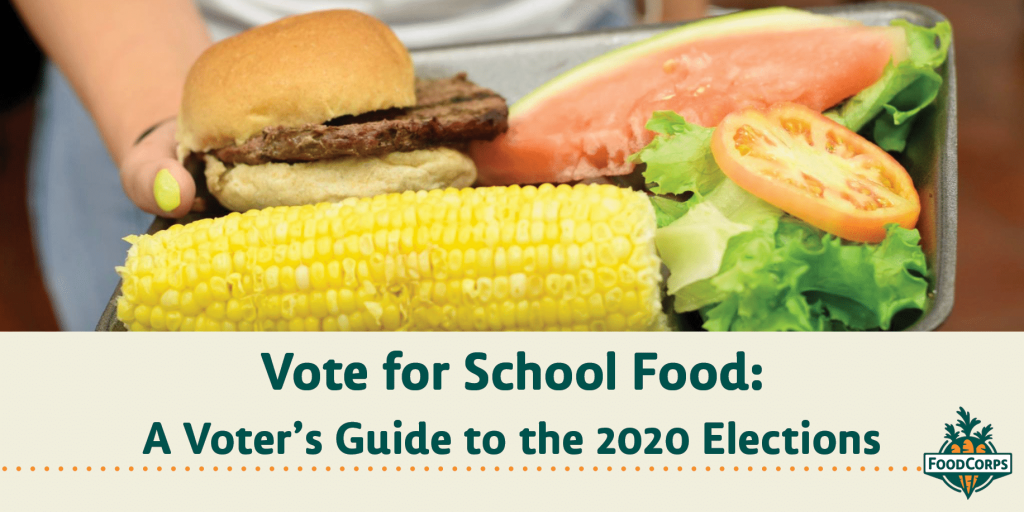The Countdown to Election 2020 Continues: October Policy Updates
As we await the election and celebrate farm to school efforts across communities, here are the policy updates you need this month.
As we await the election and celebrate farm to school efforts across communities, here are the policy updates you need this month.

Happy Farm to School Month! As we continue counting down to the election and celebrate the value of farm to school efforts across communities, here are the policy updates you need this month.
With less than two weeks until Election Day, millions of voters have already cast their absentee and mail-in ballots. While this election season feels like no other because of the COVID-19 safety measures in place, one thing remains true: your vote matters.
Your elected officials make decisions that affect students’ well-being—in and out of the cafeteria. That means you have a say in shaping kids’ access to food in your community. That’s why we’re excited to share the FoodCorps Voter Guide, a new tool to help you make informed decisions at the ballot box. Use this guide to learn about the policies that affect kids’ health and ask your candidates about their positions on the issues.
Visit our civic center to make plans to vote!
While election season is in full swing, COVID-19 cases are on the rise again in many parts of the country. All the while, more than 4 in 10 children live in households struggling to afford basic necessities including food, and families of color continue to bear a disproportionate burden of the economic and health impacts of the pandemic. What are federal lawmakers doing about it? Here’s a quick recap to help make sense of where we are on federal policies.
These advocacy wins would not have happened without strong support from advocates like you—thank you! So many of you spoke up to demand these actions, and your voice is making a big difference for kids and families across the nation.
So, what’s next? It has been over half a year since Congress passed the last round of stimulus packages known as the CARES Act. Is more help on the way and when? As we’ve reported previously, congressional leaders have been in months of back-and-forth negotiations on additional COVID-19 relief measures, with little progress. Unfortunately, it appears the future of the next relief package remains unclear. Federal lawmakers may try again to pass additional COVID-19 aids after the election. Sign up for FoodCorps policy alerts and we will let you know when to raise your voice.
Related read: Celebrating National School Lunch Week (FRAC)
Last month, the Michigan legislature and Gov. Gretchen Whitmer approved $2 million in funding to expand the popular and successful 10 Cents A Meal grant program—the nation’s leading farm to school incentive program. Now school districts statewide and early childhood centers can apply for match incentive funding up to 10 cents per meal to purchase and serve Michigan-grown fruits, vegetables, and legumes. This exciting policy win is a result of many years of advocacy led by our friends at Groundwork Center for Resilient Communities and 10 Cents A Meal campaign partners.
Related read: Michigan offers “10 Cents a Meal” for all schools to serve healthy, local food
FoodCorps is a non-partisan, non-profit organization. FoodCorps staff and FoodCorps AmeriCorps members may not participate in any partisan or seemingly partisan activities during work time charged to a Corporation for National and Community Service funded grant or while earning AmeriCorps service hours. No federal funds were used to prepare or distribute these advocacy actions.

The Policy Brief: 2025 State Policy Updates

Alumni Spotlight: Cady Molloy, School District Executive Chef

6 Careers in Food That Make a Difference